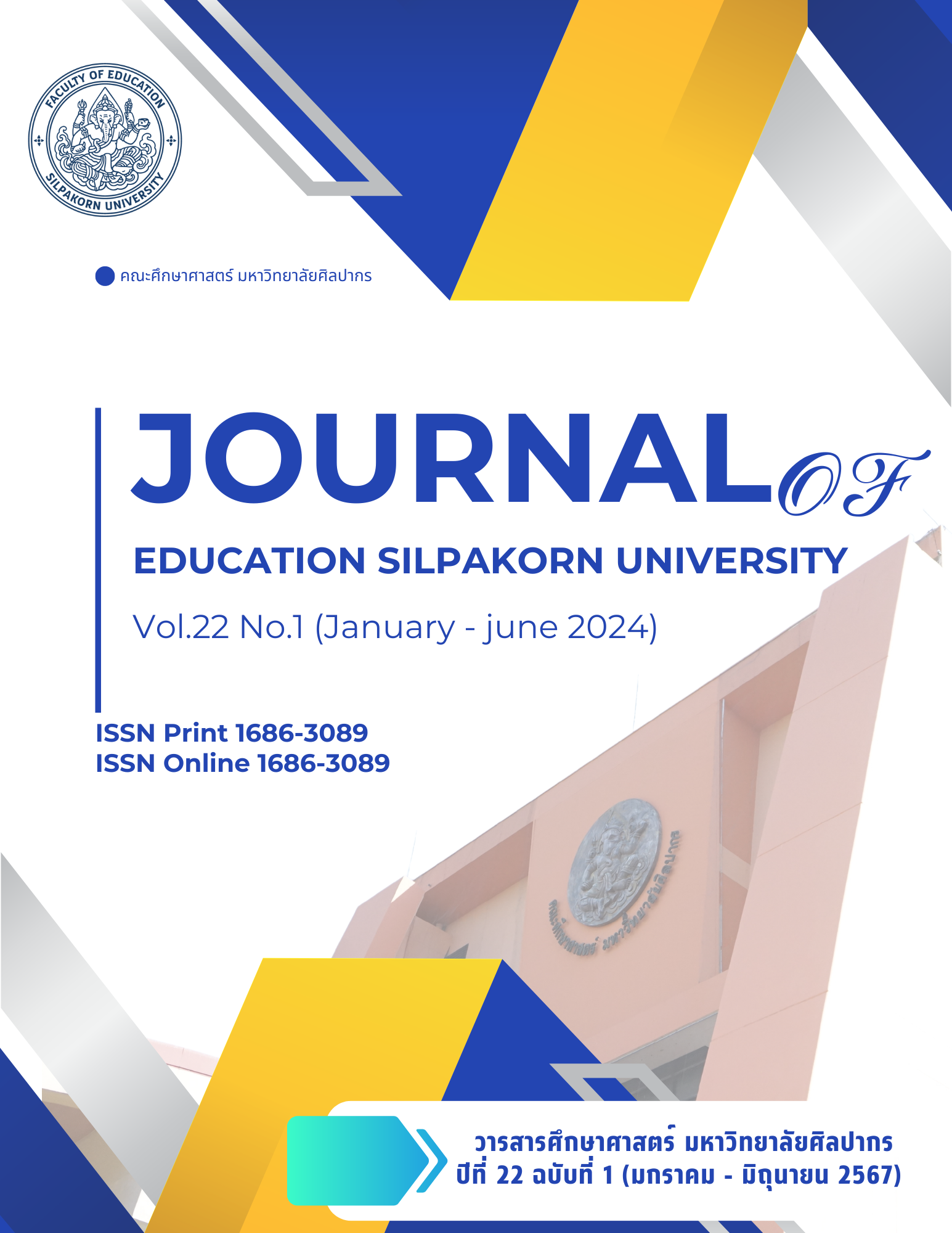The Evaluation of the Doctor of Philosophy Program in Teaching Thai Language (New Curriculum 2020), Faculty of Education, Silpakorn University
Main Article Content
Abstract
This research aimed 1) to evaluate the Doctor of Philosophy Program in Thai Language Instruction (New Curriculum 2020), Faculty of Education, Silpakorn University, and 2) to study guidelines for improving the program for the revised version in 2025. The curriculum evaluation employed Stufflebeam's CIPPI Model, comprising assessments in five areas: context, input, process, product, and impact. The instruments used were questionnaires and interviews with stakeholders of the curriculum. Quantitative data were analyzed using basic statistics, while qualitative data underwent content analysis.
The results revealed that the Doctor of Philosophy Program in Thai Language Instruction was highly appropriate in all aspects. Guidelines for curriculum improvement included: 1) maintaining the strengths of the current curriculum, 2) revising curriculum details that need improvement, such as updating course descriptions, and 3) enhancing curriculum management systems, for instance, closely monitoring students' thesis progress.
Article Details

This work is licensed under a Creative Commons Attribution-NonCommercial-NoDerivatives 4.0 International License.
References
Bonwell, C. C., & Eison, J. A. (1991). Active Learning: Creating Excitement in the Classroom.ASHE-ERIC Higher Education Report, Washington DC: School of Education and Human Development, George Washington University.
Buasomboon, B. . (2023). Development of an Instructional Model by Applying Blameless Postmortem Methods to Enhance Critical Reading Skills and Creative Problem Solving Skills of Undergraduate Students. Journal of Modern Learning Development, 8(9), 273–288. Retrieved from https://so06.tci-thaijo.org/index.php/jomld/article/view/267181
Buasomboon, B., & Kongwijit, P. (2020). The Study of Program Learning Outcomes for the Philosophy of Education Program in Teaching Thai Language, Faculty of Education, Silpakorn University. Faculty of Education, Silpakorn University.
Chong, S., Lo, W. M., & Klimas, C. (2019). Preservice teachers' development of professional competencies for 21st century teaching. The Asia-Pacific Education Researcher, 28(4), 339-351.
Chuaratanaphong, J. (1997). Curriculum development: principles and practices. Alean Press Printing House. (in Thai)
Fink, L. D. (2013). Creating significant learning experiences: An integrated approach to designing college courses. John Wiley & Sons.
Kaewurai, W. (2021). Curriculum development: from theory to practice. Naresuan University Press. (in Thai)
Kirkpatrick, D. L. (1994). Evaluating training programs: The four levels. Berrett-Koehler.
Kirkpatrick, J. D., & Kirkpatrick, W. K. (2016). Kirkpatrick’s Four Levels of Training Evaluation. Alexandria, VA: ATD Press.
Kongwijit, P. (2021). Development of an Art Reading Instructional Model by Using the Rasa Theory and the Analytical Reading Process to Promote the Rhythm Reading Ability and Reading Engagement of Undergraduate Students. Suthiparithat Journal, 35(4), 1–18. Retrieved from https://so05.tci-thaijo.org/index.php/DPUSuthiparithatJournal/article/view/254050
Office of the National Economic and Social Development Council. (2018). Master plan under the national strategy (2018-2037). Retrieved from http://nscr.nesdc.go.th/wp-content/uploads/2019/04/23-การวิจัยและพัฒนานวัตกรรม.pdf. (in Thai)
Patphol, M. (2019). Main concepts of curriculum development. Innovative Leaders Center in Curriculum and Learning. (in Thai)
Sailektim, A. (2013). Development of the Thai language curriculum. Ramkhamhaeng University Press. (in Thai)
Sinlarat, P. (2011). Teaching strategies according to the Higher Education Qualifications Standards Framework. (2nd ed.). Chulalongkorn University Press. (in Thai)
Srisa-ard, B. (2003). Curriculum development and research on curriculum. Suviriyasan. (in Thai)
Stufflebeam, D. L., McCormick, C. H., Brethower, D. M., & Nelson, C. O. (1971). Educational evaluation and decision making. Peacock Publishers.
Taba, H. (1962). Curriculum development: theory and practice. Harcourt, Brace & World.
Utranan, S. (1989). Basics and principles of curriculum development. (3rd ed.). Mitsahai. (in Thai)
Wongyai, W. (2018). Learning Assessment paradigm in the 21st century. SIKKHA Journal of Education, 3(1), 3–6. Retrieved from https://so05.tci-thaijo.org/index.php/sikkha/article/view/138612


